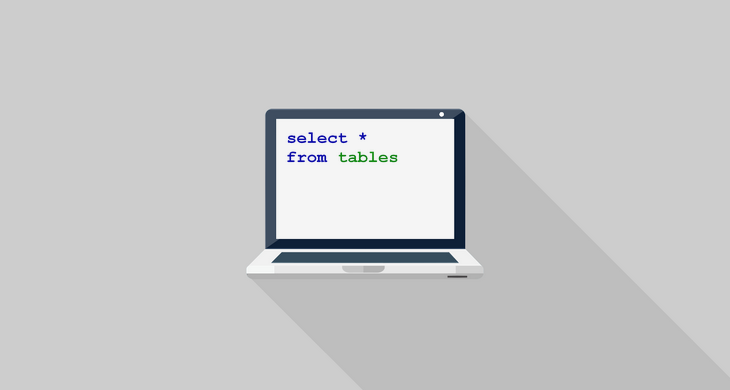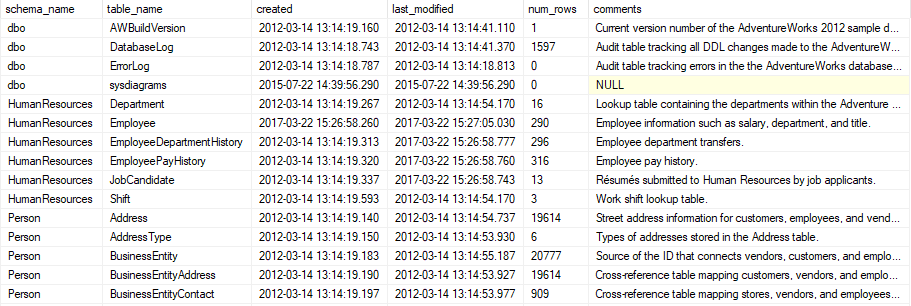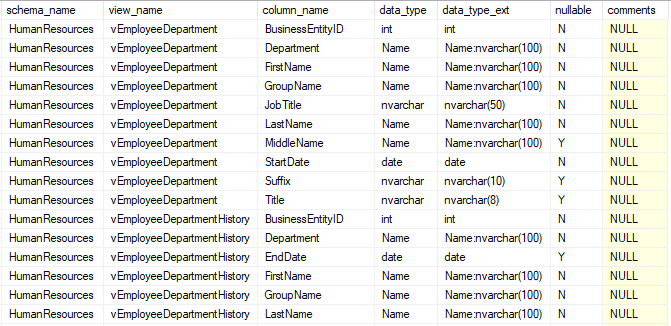![]()
Data Quality & Profiling
Improve data quality and increase trust in your data with data profiling, lineage & more.![]()
Dataedo AI
Create auto object descriptions and get help from AI chat in finding tables & writing queries. Business Glossary Build and share a universal glossary of business terms, policies and rules.![]()
Data Classification
Find and tag sensitive data in your databases to comply with data protection regulation.![]()
Data Community
![]()
Domains
![]()
Reference Data Management
![]()
StewardHub
![]()
Schema Change Tracking
![]()
Workflows

SQL Server
Power Bi
Tableau

Qlik Sense soon

Databricks
Microsoft Fabric
Azure
AWS

Oracle
![]()
Metadata Scanning
![]()
Product Tour
![]()
Why Dataedo
Book a demo Try Dataedo
This is a list of handy SQL queries to the SQL Server data dictionary. You can also find 100+ other useful queries here.
This query returns list of tables in a database sorted by schema and table name with comments and number of rows in each table.
select schema_name(tab.schema_id) as schema_name, tab.name as table_name, tab.create_date as created, tab.modify_date as last_modified, p.rows as num_rows, ep.value as comments from sys.tables tab inner join (select distinct p.object_id, sum(p.rows) rows from sys.tables t inner join sys.partitions p on p.object_id = t.object_id group by p.object_id, p.index_id) p on p.object_id = tab.object_id left join sys.extended_properties ep on tab.object_id = ep.major_id and ep.name = 'MS_Description' and ep.minor_id = 0 and ep.class_desc = 'OBJECT_OR_COLUMN' order by schema_name, table_name One row represents one table. All tables will be included.
| Column | Meaning |
|---|---|
| SCHEMA_NAME | Schema name. |
| TABLE_NAME | Table name. |
| CREATED | Table creation date and time. |
| LAST_MODIFIED | Table last modification date and time. |
| NUM_ROWS | Number of rows in the table. |
| COMMENTS | Table comments. |

This query returns list of database views with their definition SQL and a comment.
select schema_name(v.schema_id) as schema_name, v.name as view_name, v.create_date as created, v.modify_date as last_modified, m.definition, ep.value as comments from sys.views v left join sys.extended_properties ep on v.object_id = ep.major_id and ep.name = 'MS_Description' and ep.minor_id = 0 and ep.class_desc = 'OBJECT_OR_COLUMN' inner join sys.sql_modules m on m.object_id = v.object_id order by schema_name, view_name One row represents one view.
| Column | Meaning |
|---|---|
| SCHEMA_NAME | Schema name. |
| VIEW_NAME | View name. |
| CREATED | View creation date and time. |
| LAST_MODIFIED | View last modification date and time. |
| DEFINITION | View definition (SQL query). |
| COMMENTS | View comments. |

This query returns list of tables and their columns with details.
select schema_name(tab.schema_id) as schema_name, tab.name as table_name, col.name as column_name, t.name as data_type, t.name + case when t.is_user_defined = 0 then isnull('(' + case when t.name in ('binary', 'char', 'nchar', 'varchar', 'nvarchar', 'varbinary') then case col.max_length when -1 then 'MAX' else case when t.name in ('nchar', 'nvarchar') then cast(col.max_length/2 as varchar(4)) else cast(col.max_length as varchar(4)) end end when t.name in ('datetime2', 'datetimeoffset', 'time') then cast(col.scale as varchar(4)) when t.name in ('decimal', 'numeric') then cast(col.precision as varchar(4)) + ', ' + cast(col.scale as varchar(4)) end + ')', '') else ':' + (select c_t.name + isnull('(' + case when c_t.name in ('binary', 'char', 'nchar', 'varchar', 'nvarchar', 'varbinary') then case c.max_length when -1 then 'MAX' else case when t.name in ('nchar', 'nvarchar') then cast(c.max_length/2 as varchar(4)) else cast(c.max_length as varchar(4)) end end when c_t.name in ('datetime2', 'datetimeoffset', 'time') then cast(c.scale as varchar(4)) when c_t.name in ('decimal', 'numeric') then cast(c.precision as varchar(4)) + ', ' + cast(c.scale as varchar(4)) end + ')', '') from sys.columns as c inner join sys.types as c_t on c.system_type_id = c_t.user_type_id where c.object_id = col.object_id and c.column_id = col.column_id and c.user_type_id = col.user_type_id ) end as data_type_ext, case when col.is_nullable = 0 then 'N' else 'Y' end as nullable, case when def.definition is not null then def.definition else '' end as default_value, case when pk.column_id is not null then 'PK' else '' end as primary_key, case when fk.parent_column_id is not null then 'FK' else '' end as foreign_key, case when uk.column_id is not null then 'UK' else '' end as unique_key, case when ch.check_const is not null then ch.check_const else '' end as check_contraint, cc.definition as computed_column_definition, ep.value as comments from sys.tables as tab left join sys.columns as col on tab.object_id = col.object_id left join sys.types as t on col.user_type_id = t.user_type_id left join sys.default_constraints as def on def.object_id = col.default_object_id left join ( select index_columns.object_id, index_columns.column_id from sys.index_columns inner join sys.indexes on index_columns.object_id = indexes.object_id and index_columns.index_id = indexes.index_id where indexes.is_primary_key = 1 ) as pk on col.object_id = pk.object_id and col.column_id = pk.column_id left join ( select fc.parent_column_id, fc.parent_object_id from sys.foreign_keys as f inner join sys.foreign_key_columns as fc on f.object_id = fc.constraint_object_id group by fc.parent_column_id, fc.parent_object_id ) as fk on fk.parent_object_id = col.object_id and fk.parent_column_id = col.column_id left join ( select c.parent_column_id, c.parent_object_id, 'Check' check_const from sys.check_constraints as c group by c.parent_column_id, c.parent_object_id ) as ch on col.column_id = ch.parent_column_id and col.object_id = ch.parent_object_id left join ( select index_columns.object_id, index_columns.column_id from sys.index_columns inner join sys.indexes on indexes.index_id = index_columns.index_id and indexes.object_id = index_columns.object_id where indexes.is_unique_constraint = 1 group by index_columns.object_id, index_columns.column_id ) as uk on col.column_id = uk.column_id and col.object_id = uk.object_id left join sys.extended_properties as ep on tab.object_id = ep.major_id and col.column_id = ep.minor_id and ep.name = 'MS_Description' and ep.class_desc = 'OBJECT_OR_COLUMN' left join sys.computed_columns as cc on tab.object_id = cc.object_id and col.column_id = cc.column_id order by schema_name, table_name, column_name; One row represents one table column.
| Column | Meaning |
|---|---|
| SCHEMA_NAME | Schema name. |
| TABLE_NAME | Table name. |
| COLUMN_NAME | Column name. |
| DATA_TYPE | Data type. For instance, varchar or decimal. |
| DATA_TYPE_EXT | Data type with information about scale/precision or string length. For instance, varchar(100) or decimal(8, 2). |
| NULLABLE | Nullable flag. "Y" if column is nullable, "N" if column is not nullable. |
| DEFAULT_VALUE | Column default value. |
| PRIMARY_KEY | Primary key flag. "PK" when column is part of table primary key. |
| FOREIGN_KEY | Foreign key flag. "FK" when column is part of foreign key. |
| UNIQUE_KEY | Unique key flag. "UK" when column is part of unique key. |
| CHECK_CONSTRAINT | Check constraint flag. "Check" when column is part of check constraint. |
| COMPUTED_COLUMN_DEFINITION | Computed column definition (not null only if column is computed). |
| COMMENTS | Column comments. |

This query returns list of tables and their foreign keys.
select schema_name(tab.schema_id) as table_schema_name, tab.name as table_name, col.name as column_name, fk.name as constraint_name, schema_name(tab_prim.schema_id) as primary_table_schema_name, tab_prim.name as primary_table_name, col_prim.name as primary_table_column, schema_name(tab.schema_id) + '.' + tab.name + '.' + col.name + ' = ' + schema_name(tab_prim.schema_id) + '.' + tab_prim.name + '.' + col_prim.name as join_condition, case when count(*) over (partition by fk.name) > 1 then 'Y' else 'N' end as complex_fk, fkc.constraint_column_id as fk_part from sys.tables as tab inner join sys.foreign_keys as fk on tab.object_id = fk.parent_object_id inner join sys.foreign_key_columns as fkc on fk.object_id = fkc.constraint_object_id inner join sys.columns as col on fkc.parent_object_id = col.object_id and fkc.parent_column_id = col.column_id inner join sys.columns as col_prim on fkc.referenced_object_id = col_prim.object_id and fkc.referenced_column_id = col_prim.column_id inner join sys.tables as tab_prim on fk.referenced_object_id = tab_prim.object_id order by table_schema_name, table_name, primary_table_name, fk_part; One row represents one pair of columns in foreign key.
| Column | Meaning |
|---|---|
| TABLE_SCHEMA_NAME | Foreign table schema name. |
| TABLE_NAME | Foreign table name. |
| COLUMN_NAME | Foreign table column name. |
| CONSTRAINT_NAME | Constraint name. |
| PRIMARY_TABLE_SCHEMA_NAME | Primary table schema name. |
| PRIMARY_TABLE_NAME | Primary table name. |
| PRIMARY_TABLE_COLUMN | Primary table column name. |
| JOIN_CONDITION | Join condition containing foreign and primary key tables and columns. |
| COMPLEX_FK | Complex foreign key flag. "Y" when foreign key is complex, otherwise "N". |
| FK_PART | Represents part number of foreign key. |

This query returns list of views with their columns.
select schema_name(v.schema_id) as schema_name, v.name as view_name, col.name as column_name, t.name as data_type, t.name + case when t.is_user_defined = 0 then isnull('(' + case when t.name in ('binary', 'char', 'nchar', 'varchar', 'nvarchar', 'varbinary') then case col.max_length when -1 then 'MAX' else case when t.name in ('nchar', 'nvarchar') then cast(col.max_length/2 as varchar(4)) else cast(col.max_length as varchar(4)) end end when t.name in ('datetime2', 'datetimeoffset', 'time') then cast(col.scale as varchar(4)) when t.name in ('decimal', 'numeric') then cast(col.precision as varchar(4)) + ', ' + cast(col.scale as varchar(4)) end + ')', '') else ':' + (select c_t.name + isnull('(' + case when c_t.name in ('binary', 'char', 'nchar', 'varchar', 'nvarchar', 'varbinary') then case c.max_length when -1 then 'MAX' else case when t.name in ('nchar', 'nvarchar') then cast(c.max_length/2 as varchar(4)) else cast(c.max_length as varchar(4)) end end when c_t.name in ('datetime2', 'datetimeoffset', 'time') then cast(c.scale as varchar(4)) when c_t.name in ('decimal', 'numeric') then cast(c.precision as varchar(4)) + ', ' + cast(c.scale as varchar(4)) end + ')', '') from sys.columns as c inner join sys.types as c_t on c.system_type_id = c_t.user_type_id where c.object_id = col.object_id and c.column_id = col.column_id and c.user_type_id = col.user_type_id ) end as data_type_ext, case when col.is_nullable = 0 then 'N' else 'Y' end as nullable, ep.value as comments from sys.views as v join sys.columns as col on v.object_id = col.object_id left join sys.types as t on col.user_type_id = t.user_type_id left join sys.extended_properties as ep on v.object_id = ep.major_id and col.column_id = ep.minor_id and ep.name = 'MS_Description' and ep.class_desc = 'OBJECT_OR_COLUMN' order by schema_name, view_name, column_name; One row represents one view column.
| Column | Meaning |
|---|---|
| SCHEMA_NAME | Schema name. |
| VIEW_NAME | View name. |
| COLUMN_NAME | View column name. |
| DATA_TYPE | Data type. For instance, varchar or decimal. |
| DATA_TYPE_EXT | Data type with information about scale/precision or string length. For instance, varchar(100) or decimal(8, 2). |
| NULLABLE | Nullable flag. "Y" if column is nullable, "N" if column is not nullable. |
| COMMENTS | Column comments. |

This query returns list of tables sorted by the number of columns they contain.
select schema_name(tab.schema_id) as schema_name, tab.name as table_name, count(*) as columns from sys.tables as tab inner join sys.columns as col on tab.object_id = col.object_id group by schema_name(tab.schema_id), tab.name order by count(*) desc; One row represents one user table.
| Column | Meaning |
|---|---|
| SCHEMA_NAME | Schema name. |
| TABLE_NAME | Table name. |
| COLUMNS | Number of columns table contains. |